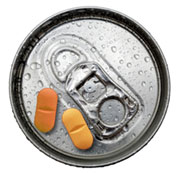
News flash: Coca-Cola has responded to consumer demand and is now producing “healthy” beverages.
“Diet and light brands are actually health and wellness brands,” Coke’s CEO E. Neville Isdell told The New York Times.
He was referring to a new product called Diet Coke Plus, which is Diet Coke plus a few vitamins.
Where do I start?
Diet Coke consists of artificially blackened water tinged with synthetic chemicals. Here are its ingredients, from most prevalent to least: carbonated water, caramel color, aspartame, phosphoric acid, potassium benzoate (to protect taste), natural flavors, citric acid; and caffeine [emphasis added].
To protect taste? What are people supposed to be tasting? Oh right, there it is: “natural flavors.” Note that the swill contains more of the chemical designed to protect said flavors than the flavors themselves. Like mob bosses and presidents, I guess they need a lot of protection.
Seriously, though: Diet Coke is a nutritional void. Human bodies evolved to make use of a variety of foods, but I doubt isolated versions of phosphoric acid, etc., are among them. And aspartame, aka Nutrasweet, may cause active damage.
Can this questionable brew be made “healthy” by adding a few isolated nutrients, quite likely conjured up in the bustling labs of Archer Daniels Midland?
No, I don’t think it works that way. Michael Pollan’s recent New York Times Magazine piece exposed the absurdity of that notion. It turns out that systematically stripping nutrition out of food, and then adding it later in isolated form, is a bust. Isolated vitamins and other nutrients just don’t pack the same benefits as when they occur in whole foods.
Then there’s the question of aspartame. Italian researchers writing in Environmental Health Perspectives recently added (PDF) to a growing body of literature pointing to aspartame’s possible role as a carcinogen.
Why would the FDA allow it? In 1981, a company called Searle owned the patent on aspartame, already known, paradoxically, as Nutrasweet. The company’s CEO? Donald Rumsfeld — not too far removed from serving as Gerald Ford’s secretary of defense. Don’t believe me? Check it out.
Then-president Ronald Reagan had appointed a man named Arthur Hull Hayes as his FDA chair. In 1981, Hayes approved aspartame over the objections of several internal panels.
Rummy, of course, would go on to greater things, but not before engineering the sale of Searle and its suddenly quite valuable Nutrasweet division to Monsanto (which in turn sold Nutrasweet to a private-equity firm).
As for Hayes, he exited the FDA and entered a robust career, which continues today, as a biotech exec and serial corporate board sitter.
The mind reels. I think I’ll go eat an apple.


